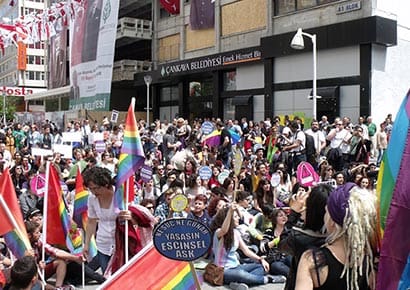Turkey | LGBTI people living in fear

Ankara Pride 2012
Amnesty International has highlighted the increasingly dire scenario facing LGBTI people and human rights activists in Turkey.
The country is being strangled by the ongoing state of emergency, which was declared in July 2016 as a “temporary” measure in the wake of a failed coup attempt. The state of emergency was renewed again last week.
According to a new report by Amnesty International, the situation has meant that “the rights to freedom of expression to liberty and security and to fair trials have been decimated” in Turkey.
“Under the cloak of the state of emergency, Turkish authorities have deliberately and methodically set about dismantling civil society, locking up human rights defenders, shutting down organisations and creating a suffocating climate of fear,” said Amnesty International’s Europe Director, Gauri van Gulik.
Blanket bans on public gatherings in cities across Turkey have curtailed the right to assembly and association for all citizens. LGBTI organisations also speak of being pushed “underground” with public events such as gay pride marches and film festivals banned in several cities.
While homosexuality is not illegal in Turkey, the LGBTI community faces increased discrimination, stigma and limitations on its freedoms. As recently as June 2014 tens of thousands of people marched through the streets for Istanbul Pride.
But that is now a distant memory. Istanbul Pride parades have been banned by that city’s authorities for the last three years, with officials claiming to fear for public safety.
In November last Ankara Governor’s Office indefinitely banned all LGBTI events in Turkey’s capital, including LGBTI “cinema, theatre performances, panels, interviews and exhibitions”. The reason was “in order to provide peace and security”.
One activist told Amnesty International’s Milena Buyum: “Most LGBTI people in Turkey today are living in more fear than ever before. With the crackdown on freedom of expression, spaces for LGBTI people to be themselves are shrinking. They see no hope, no future. Many of us have either moved to other countries or are thinking of leaving.”
The activist added: “In Izmir, Istanbul and Ankara we can still meet each other but it is getting very hard. We used to have about 30 associations around the country – most of them are now closed and not functioning.”
Meanwhile, more than 100,000 people, including journalists, academics, activists and political dissidents from all walks of life, have faced criminal investigations related to the state of emergency and at least 50,000 people have been imprisoned pending trial. More than 107,000 public sector employees have been summarily dismissed.
“Extraordinary measures are becoming increasingly normalised in Turkey, and yet in spite of the pernicious, deliberate and targeted onslaught against individuals and groups, there are still brave people in Turkey willing to stand up and speak out,” said van Gulik.
“The international community should stand with them and call on the Turkish authorities to lift restrictions on civil society organisations, end the crackdown on freedoms and lift the climate of fear and intimidation.”
Leave a Reply